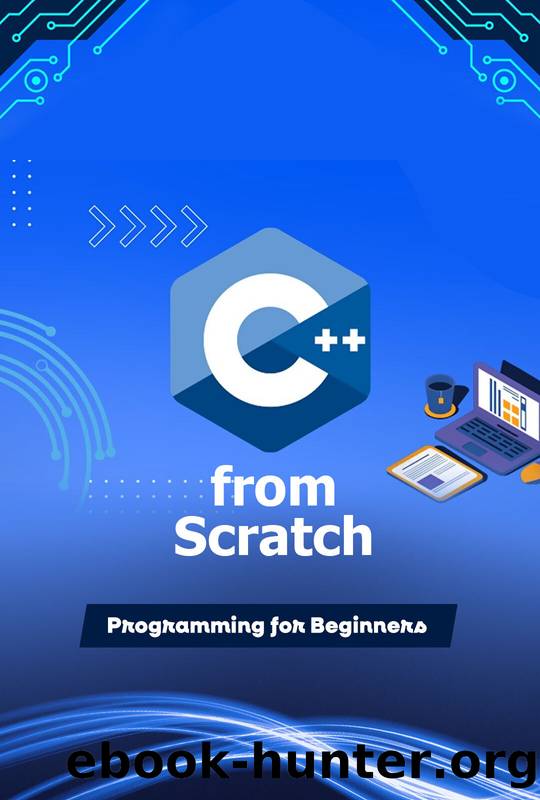C++ from Scratch: C++ from Scratch by R. Raphael

Author:R., Raphael
Language: eng
Format: epub
Published: 2024-01-05T00:00:00+00:00
Chapter 9: File Manipulation in C++
In this chapter, you will learn how to manipulate files in C++. File manipulation is a crucial part of programming because it allows you to read and write data to external files, which is useful for storing persistent information.
### Opening a File
To open a file in C++, you use the ` fstream` class . There are three main ways to open a file:
- Reading Mode (` ios :: in`): Opens the file for reading.
- Write Mode (` ios :: out`): Opens the file for writing.
- Append Mode (` ios :: app`): Opens the file for writing, but adds new data to the end of the file.
Here is how to open a file for reading:
``` cpp
#include <fstream> _
int main ( ) {
std :: fstream file("example.txt", std :: ios ::in);
if ( file.is_ open ( )) {
// The file was opened successfully, you can read data here
} else {
// The file could not be opened
}
file.close (); // Close the file when finished
return 0;
}
```
### Reading and Writing to Files
To read data from a file, you can use input operators (`>>`) or read functions. For example:
``` cpp
int number ;
file >> number ; // Read a number from the file
```
To write data to a file, use output operators (`<<`) or write functions. For example:
``` cpp
int number = 42;
file << number ; // Write the number to the file
```
### Checking File Status
Always check the file status after opening or operating on it to ensure the operation was successful. You can do this using the ` is_open ( ) ` and ` fail ()` functions.
### Manipulating Text and Binary Files
C++ allows you to manipulate both text and binary files. The choice depends on the type of data you are storing. Text files are human readable while binary files store data directly in binary format.
### Conclusion
File manipulation is an essential skill in programming. You can use it to store and retrieve persistent data, such as application settings or game information. Make sure you understand how to open, read, and write files in C++ to be a more versatile programmer.
In the next chapter, we will cover exception and error handling, which is important for dealing with unexpected situations in your program. Keep practicing file manipulation to strengthen your skills.
Download
This site does not store any files on its server. We only index and link to content provided by other sites. Please contact the content providers to delete copyright contents if any and email us, we'll remove relevant links or contents immediately.
The Mikado Method by Ola Ellnestam Daniel Brolund(23444)
Hello! Python by Anthony Briggs(22581)
Secrets of the JavaScript Ninja by John Resig Bear Bibeault(21377)
Kotlin in Action by Dmitry Jemerov(20427)
Dependency Injection in .NET by Mark Seemann(20380)
The Well-Grounded Java Developer by Benjamin J. Evans Martijn Verburg(20264)
OCA Java SE 8 Programmer I Certification Guide by Mala Gupta(19442)
Algorithms of the Intelligent Web by Haralambos Marmanis;Dmitry Babenko(18251)
Grails in Action by Glen Smith Peter Ledbrook(17374)
Adobe Camera Raw For Digital Photographers Only by Rob Sheppard(16973)
Test-Driven iOS Development with Swift 4 by Dominik Hauser(11207)
Becoming a Dynamics 365 Finance and Supply Chain Solution Architect by Brent Dawson(8071)
Microservices with Go by Alexander Shuiskov(7841)
Practical Design Patterns for Java Developers by Miroslav Wengner(7738)
Test Automation Engineering Handbook by Manikandan Sambamurthy(7699)
Angular Projects - Third Edition by Aristeidis Bampakos(7182)
The Art of Crafting User Stories by The Art of Crafting User Stories(6639)
NetSuite for Consultants - Second Edition by Peter Ries(6558)
Demystifying Cryptography with OpenSSL 3.0 by Alexei Khlebnikov(6324)
